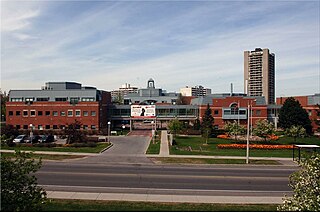
Blood transfusion is the process of transferring blood products into a person's circulation intravenously. Transfusions are used for various medical conditions to replace lost components of the blood. Early transfusions used whole blood, but modern medical practice commonly uses only components of the blood, such as red blood cells, plasma, platelets, and other clotting factors. White blood cells are transfused only in very rare circumstances, since granulocyte transfusion has limited applications. Whole blood has come back into use in the setting of trauma.
Transfusion medicine is the branch of medicine that encompasses all aspects of the transfusion of blood and blood components including aspects related to hemovigilance. It includes issues of blood donation, immunohematology and other laboratory testing for transfusion-transmitted diseases, management and monitoring of clinical transfusion practices, patient blood management, therapeutic apheresis, stem cell collections, cellular therapy, and coagulation. Laboratory management and understanding of state and federal regulations related to blood products are also a large part of the field.

A blood bank is a center where blood gathered as a result of blood donation is stored and preserved for later use in blood transfusion. The term "blood bank" typically refers to a department of a hospital usually within a clinical pathology laboratory where the storage of blood product occurs and where pre-transfusion and blood compatibility testing is performed. However, it sometimes refers to a collection center, and some hospitals also perform collection. Blood banking includes tasks related to blood collection, processing, testing, separation, and storage.

AABB is an international, not-for-profit organization representing individuals and institutions involved in the field of transfusion medicine and biotherapies.
A cord blood bank is a facility which stores umbilical cord blood for future use. Both private and public cord blood banks have developed in response to the potential for cord blood in treating diseases of the blood and immune systems. Public cord blood banks accept donations to be used for anyone in need, and as such function like public blood banks. Traditionally, public cord blood banking has been more widely accepted by the medical community. Private cord blood banks store cord blood solely for potential use by the donor or donor's family. Private banks typically charge around $2,000 for the collection and around $200 a year for storage.

Anthony Nolan is a UK charity that works in the areas of leukaemia and hematopoietic stem cell transplantation. It manages and recruits donors to the Anthony Nolan Register, which is part of an aligned registry that also includes the Welsh Bone Marrow Donor Registry, NHS Blood and Transplant's British Bone Marrow Registry and Deutsche KnochenMarkSpenderdatei (DKMS) UK. This aligned register is known as the Anthony Nolan & NHS Stem Cell Registry. It also carries out research to help make bone marrow transplants more effective.

Canadian Blood Services is a non-profit charitable organization that is independent from the Canadian government. The Canadian Blood Services was established as Canada's blood authority in all provinces and territories except for Quebec in 1998. The federal, provincial and territorial governments created the Canadian Blood Services through a memorandum of understanding. Canadian Blood Services is funded mainly through the provincial and territorial governments.
Cord blood is blood that remains in the placenta and in the attached umbilical cord after childbirth. Cord blood is collected because it contains stem cells, which can be used to treat hematopoietic and genetic disorders such as cancer.
The Singapore Cord Blood Bank is Singapore's only public cord blood bank that collects, processes and stores donated umbilical cord blood for use in stem cell transplants. Its cord blood units may be searched for use by qualifying transplant centers around the world.

In England, blood and other tissues are collected by NHS Blood and Transplant (NHSBT). NHSBT Blood Donation was previously known as the National Blood Service until it merged with UK Transplant in 2005 to form a NHS special health authority. Other official blood services in the United Kingdom include the Northern Ireland Blood Transfusion Service, the Scottish National Blood Transfusion Service and the Welsh Blood Service.
NHS Blood and Transplant is an executive special health authority of the United Kingdom's Department of Health and Social Care. It was established on 1 October 2005 to take over the responsibilities of two separate NHS agencies: UK Transplant, founded by Dr. Geoffrey Tovey in 1972, and the National Blood Service. Its remit is to provide a reliable, efficient supply of blood, organs and associated services to the NHS. Since NHSBT was established, the organisation has maintained or improved the quality of the services delivered to patients, stabilised the rising cost of blood, and centralised a number of corporate services.

The Health Sciences Authority (HSA) is a statutory board under the Ministry of Health of the Government of Singapore. It is a multi-disciplinary agency responsible for applying medical, pharmaceutical, and scientific expertise to protect and advance public health and safety.

The European Directorate for the Quality of Medicines & HealthCare (EDQM) is a Directorate and partial agreement of the Council of Europe that traces its origins and statutes to the Convention on the Elaboration of a European Pharmacopoeia.

The Scottish National Blood Transfusion Service (SNBTS) is the national blood, blood product and tissue provider. It makes up a Strategic Business Unit of NHS National Services Scotland (NSS).
The New Zealand Blood Service is the provider of blood services for New Zealand. The service is a Crown entity responsible to New Zealand's Parliament and is governed by a Board appointed by the Minister of Health.

The MSM blood donor controversy in the United Kingdom refers to the former deferral policy of men who have had sex with men (MSM) in the United Kingdom who wish to donate their blood to UK blood donation services. Since June 2021, there is no deferral period in all four home nations. This followed an announcement in December 2020 that blood donation policies specific to MSM would be scrapped in favour of personalised risk assessment based on sexual behaviour.

King Fahad Specialist Hospital-Dammam (KFSHD) is a district general hospital in the Eastern region of Saudi Arabia.
NHSBT Blood Donation is responsible for the collection and distribution of blood products within England. Other parts of the United Kingdom are served by the Northern Ireland Blood Transfusion Service, the Scottish National Blood Transfusion Service, and the Welsh Blood Service. Blood Donation is part of NHS Blood and Transplant, which was established as a special health authority in October 2005 and also has responsibility for NHSBT Organ Donation and Transplantation.

Blood compatibility testing is conducted in a medical laboratory to identify potential incompatibilities between blood group systems in blood transfusion. It is also used to diagnose and prevent some complications of pregnancy that can occur when the baby has a different blood group from the mother. Blood compatibility testing includes blood typing, which detects the antigens on red blood cells that determine a person's blood type; testing for unexpected antibodies against blood group antigens ; and, in the case of blood transfusions, mixing the recipient's plasma with the donor's red blood cells to detect incompatibilities (crossmatching). Routine blood typing involves determining the ABO and RhD type, and involves both identification of ABO antigens on red blood cells and identification of ABO antibodies in the plasma. Other blood group antigens may be tested for in specific clinical situations.
The Iranian Blood Transfusion Organization or acronymly IBTO is the highest and only decision-making authority in the field of supply and distribution of healthy blood and blood products in Iran. This organization was established in July 31, 1974.











